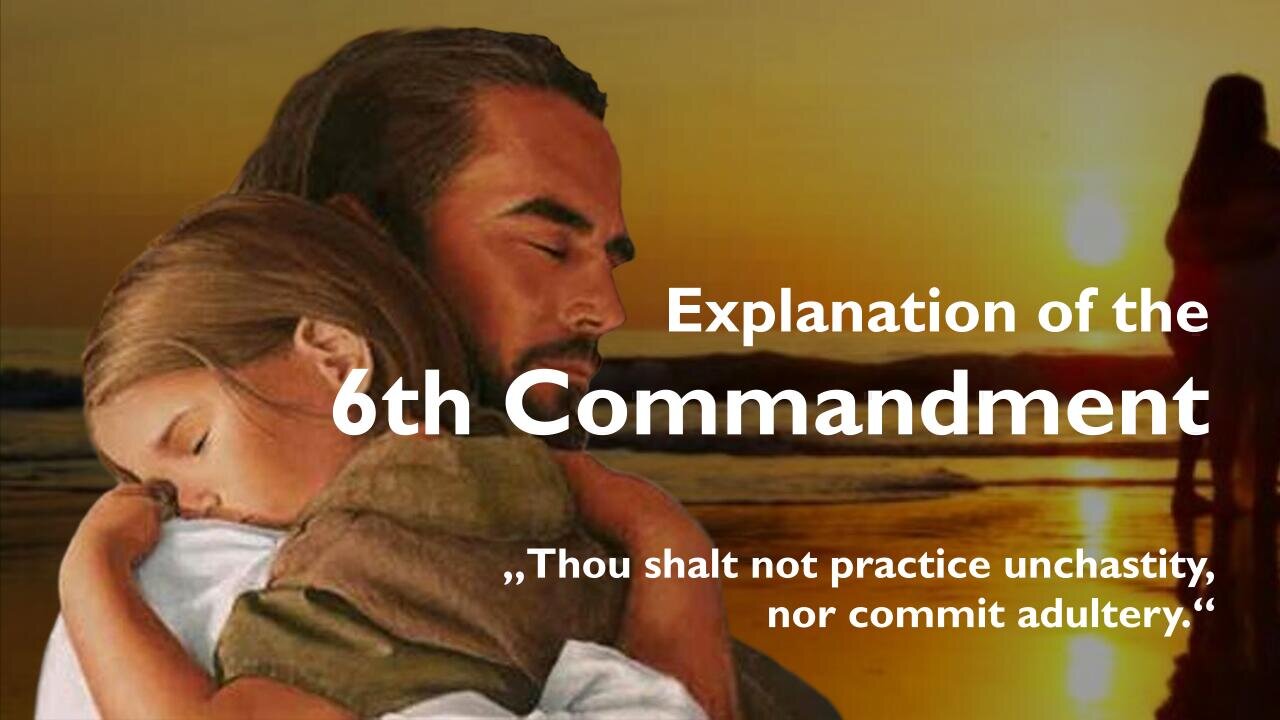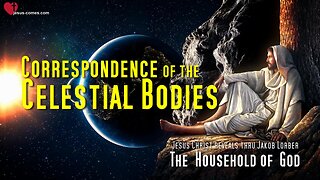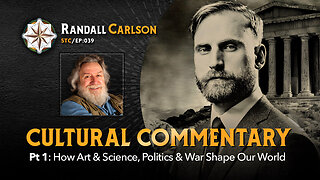Premium Only Content

Commandment 6 ❤️ You shall not practice Unchastity and commit Adultery... What does that mean?
Text & Audio to Videocontent & Related Messages... https://jesus-comes.com/index.php/2018/09/16/du-sollst-nicht-ehebrechen-you-shall-not-commit-adultery/
Channel Overview... https://jesus-comes.com/index.php/2022/10/16/kanalubersicht-channel-overview/
Video Playlist Commandments of God... https://www.youtube.com/playlist?list=PL73-eEs6JmCsw5J2MK1od7SnWFzMmUpBW
Commandments Overview... https://jesus-comes.com/index.php/2015/12/03/erlaeuterung-zu-den-zwoelf-geboten-des-herrn-10-gebote-moses-und-die-2-gebote-der-liebe-jakob-lorber/
Read online... https://search.jesus-comes.com/index.php?title=SSUN2-79
The Third Testament in various Languages... https://jesus-comes.com/index.php/das-dritte-testament-the-third-testament-el-tercer-testamento/
Jesus' Revelations thru Jakob Lorber... https://jesus-comes.com/index.php/category/english/jakob-lorber-pdfs/
Jesus' Revelations thru Gottfried Mayerhofer... https://jesus-comes.com/index.php/category/english/53-sermons-of-jesus/
LoveLetters from Jesus... https://jesus-comes.com/index.php/liebesbriefe-von-jesus-love-letters-from-jesus/
Trumpet Call of God... https://awakeningforreality.com/latest-video-and-audio-letters-neuste-video-und-audio-briefe/
The 6th Commandment …
You shall not practice Unchastity, nor commit Adultery
Jesus reveals the spiritual Sun thru Jakob Lorber
Chapter 79 – The sixth commandment in the sixth room – What is unchastity?
79,1. Here again we see a tablet in the middle of the sixth room. On the board is written in clearly legible writing: “Thou shalt not practice unchastity, nor commit adultery.” This is unmistakably the sixth commandment that the Lord has given to the Israelite people through Moses (Exodus 20:14, Deuteronomy 5:18, Matthew 5:27). This commandment is certainly one of the most difficult to grasp in its fundamental condition and then to exactly observe it in the very basis of life.
79,2. What is forbidden by this commandment? – And who cares about this commandment, the spirit, the soul or the body? Who is not supposed to drive unchastity out of these three life potentials? That would be a question. But what is actually the unchastity and what the adultery? Is unchastity the mutual act of mating? If that is the case, then by this commandment every act of procreation is included; for in this simple commandment we find absolutely no conditional exception; it is said, “Thou shalt not practice unchastity.
79,3. So if the act of intercourse is, in a certain way, regarded as the culmination of unchastity, I would like to know even the one who, under the present form of things on earth, could beget a generation without this forbidden act. Whether in marriage or out of marriage, the act is the same. Whether he is really committed with the intent of child-making or not, it is the same. Moreover, the commandment itself has no condition in which a regular marriage would be exempt from unchastity.
79,4. On the other hand, however, every human being must understand that the Lord is very much in favor of the reproduction of the human race, and to a wise education of the same. But by what means should the human race reproduce, if the act of procreation is forbidden on punishment of eternal death? I think that every human being can easily understand that there is a catch here.
79,5. But for that, everyone must necessarily bear witness that, among all the commandments that should be kept, nature will generally throw a mighty stick before the feet of man over which he must stumble, as with exactly this one. Anyone who enjoyed an even moderately decent education, has no problem, or at most only a very slight one, in the keeping of the other commandments; but with this commandment, nature always draws a strong line, even through the account of the apostle Paul!
79,6. We see an apparent prohibition of carnal pleasure, which is inseparably connected with the act of procreation. If, then, the prohibition lies only in carnal pleasure and not at the same time also in the act of procreation, then it is to be wondered whether carnal pleasure can be separated from the orderly act of procreation? Who among you can prove this and claim that two legally ordered spouses do not feel the temporal desire in the act of procreation? Or where is that couple that would not have been at least halfway driven by the imminent carnal desire for the act of procreation?
79,7. But we can see from this that we cannot possibly understand this commandment with regard to unchastity with regard to the bodily act of procreation. There must be either a pure act of procreation which has nothing to do with the lust of the flesh, or if such an act cannot be proved, the carnal act of procreation need not stand under this law and be regarded as a voluntary, unpunishable act of people. For it has been said before that the law is relentlessly expressed and without room for exception.
79,8. The necessary existence of people speaks out loud against the prohibition of this act, as well as the always relentlessly desiring nature. For, regardless of someone’s class, he will not be acquitted of it when he has reached maturity. He would then have to kill his nature through mutilation, for nothing would curb his concupiscence by any means, even if he would be prevented from doing so by external circumstances.
79,9. So is there nothing to be done with the flesh. Maybe this law affects only the soul? I mean, since the soul is quite the living principle of the body and the free action of it depends purely on the soul, which is dead without the flesh, then it would hardly be difficult to find a super-scholar anywhere who could seriously claim that the soul has nothing to do with the free actions of the body.
79,10. After all, the body is only a tool of the soul, artfully furnished for its use; So what can we do with a commandment only applicable to the body, which in and of itself is a dead machine? If someone made a clumsy hit with a hoe, was it the fault of the hoe or his hand? I think nobody would to say that it is the hoe’s fault.
79,11. Neither can one attribute the act of procreation to the body as a sinful act, but only to the acting principle, which here is the living soul. Thus, our previous critical illumination of this commandment must apply only to the soul which thinks, wants and acts in the flesh; and so the soul is necessarily free from this commandment, according to the applied criterion. So, since it’s not possible with the soul either; will it be applicable to the spirit? We shall see what is to be gained with the spirit.
79,12. What is the spirit? The spirit is the real life-principle of the soul, and without the spirit, the soul is nothing but a substantial etheric organ, which possesses all ability to absorb life, but without the spirit is nothing but a substantial-spiritual-etheric polyp, only continuously spreading its arms after life and suck up everything that corresponds to its nature.
79,13. The soul without the spirit is therefore a mere dumb polar force, which carries the dull sense of satiety in itself, but possesses no judgment, from which it would become clear, with what it saturates itself and what this saturation serves for. It is comparable to an arch-cretin who feels no desire other than to satisfy himself. With what and why? He himself has no idea. When he feels a great hunger, he eats what comes to his aid, whether it be filth, or bread, or the impure food for pigs, all is equal to him.
79,14. See, the same it is with the soul without the spirit. And these driven cretins have also only a soul life, that is, in whose soul either too weak a spirit or often no spirit is present. But to know that this is so, you need nothing more than to look into the world of the dark spirits; What are these? They are living souls after death, who lived their lives in the most reckless and often malicious manner, and have so weakened and depressed their spirits, that in such a condition they are scarcely capable of procuring the life-saving stimulus, often pushing back all life-benefits into the eternal background!
79,15. How does such beings act in the hereafter compared to blessed living spirits ? No different than bums, therefore as spiritual insane ones, being still in all possible ways malformed, showing no evidence of a human stature. These beings are often with regard to their actions in the spiritual realm, just as accountable as a cretin on your earth. This shows that not the soul in itself, but only the soul in possession of the spirit, can be held accountable, for only in the spirit dwells the free will; in essence, it is all in the spirit.
79,16. But if this is now evident, then the question arises: How and in what way can the absolute spirit commit unchastity? Can the spirit have carnal desires? I think there could hardly be a greater contradiction than if someone wanted to seriously think of a ‘carnal spirit’, which would necessarily have to be material in order to even have gross material desires in it.
79,17. But just like an arrested one does not find any comfort in his arrest, the absolute spirit has even less passion to unite forever with his free nature with coarse matter, and to find his pleasure in it. Therefore would the notion of an unchaste acting spirit surely be the greatest nonsense a person can ever pronounce. Now one wonders: What, then, is unchastity, and who should not do it by seeing that neither the body, nor the soul, nor the spirit can impart unchastity to themselves, as we now came to know them?
Chapter 80
About two kinds of love
80,1. While some may say, Moses later elaborated on this by lawfully allowing the act of procreation only between the blessed spouses, but forbade it otherwise, and has ordained the other kind of procreation, especially if a married man wishes to commit this act that such an act should be regarded as adultery and that adulterers are guilty of death on both sides. This is correct, but subsequent ordinances nevertheless do not give a different form to the law which was simply given in the beginning. Whoever wants to commit himself to this must assert his trial in the first law; for neither unchastity nor adultery are forbidden in a certain way.
80,2. So far, we have clearly explained what you could possibly understand by unchastity. But since all this points to the act of procreation, it is impossible to regard as forbidden the kind of unchastity we have hitherto supposed to be known by this law.
80,3. Now, however, a well-informed one announces himself in the matter, saying: Under unchastity, which is forbidden there, only the empty gratification of the sensual impulse is understood. Good, I say; but if a man with another man’s wife, who cannot be fertilized by her husband, seriously longs for a child, I ask: can this be counted as sinful adultery? I also ask: If a young man, driven by his nature, has fathered a child with a girl, can that be counted as a sin of unchastity?
80,4. I also ask: If a man knows from experience that his wife is not fertile, he nevertheless sleeps with her because she has a rich flesh that stimulates him, and he therefore evidently only vainly satisfies his sensuous instinct; can this act be credited to the sin of unchastity?
80,5. I ask further: There are, especially in this time, as there have been at all times, an immense number of people of both sexes who are well able to produce and have a nature which is powerfully urgent; but they are unable, by virtue of political and meager circumstances, to marry. Now, if such doubly afflicted people commit the act of procreation, do they again sin against this sixth commandment?
80,6. It will be said: They are to sacrifice their instinct to God and not mate, so they will not sin. But I say: what judge can declare such a failing as a real sin? What, then, does the rich have the merit of being able to take a decent wife, but the poor are denied this bliss? Should the privileged have a greater right to procreation than the poor? Does money thus sanctify procreation because the rich can afford the proper possession of a woman, which is impossible for a thousand less privileged ones?
80,7. One can still ask: Who is really to blame for the multifarious impoverishment of the people? Certainly none other than the fortunate kingdom, who attracts many treasures through his self-serving speculation, by which not infrequently a thousand people could adequately qualify for ordinary marital status. And yet should the rich husband alone be free from the sin of unchastity, when he bears children with his own wife, and the poor man alone should be the scapegoat because he cannot take a wife? Would not that be just as condemnable as if one would on earth decide to go on a pilgrimage to a place, and be given a commandment that no one should visit this place on foot in order to receive any grace there, but everyone who visits this place and would want to receive grace, must go there in a most elegant equipage?
80,8. He who should find such a command righteous must certainly be in earnest of such a world, of which the Creator of heaven and the earth Himself knows nothing, that is, of a world which does not exist anywhere; or he would have to be a member of Satan!
80,9. But we now see from these considerations that it does not quite do with the explanation of our sixth commandment. What will we do to gain the full meaning of this commandment? I tell you in advance: It’s not as easy as anyone would like to imagine. Yes, I say:
80,10. In order to gain the right meaning of this commandment, one must burrow deeply and grasp the matter at the root; otherwise one will always find oneself in the dubious position in which it is easy to regard as sin what is not a sin in the farthest sense, and what is really a sin, scarcely worth the trouble, considers it to be a sin.
80,11. But where is this root? We will find it right away. You know that love is the foundation and the basic condition of all things. Without love, nothing would never have been created, and without love, no existence would be conceivable, just as little as a world would ever have been formed without the mutual attraction of the will of the Creator. For example, if you do not understand this, think of one world without the mutual power of attraction, and you’ll see how all the atoms of a world suddenly separate and vanish into nothingness.
80,12. Love is therefore the cause of everything and at the same time it is the key to all secrets.
80,13. But how can love be brought into an explanatory connection with our sixth commandment? I say to you, nothing easier than that, because in no act in the world is love as intimately interwoven as in the one we count as uncouth.
80,14. But we know that man is capable of a twofold love, namely the Divine, which opposes all self-love, and the self-love, which is contrary to all Divine love.
80,15. The question now is: if someone commits the act of procreation, what love was there the motive: the self-love, under whose authority also any craving for pleasure stands, or the Divine love, which only wants to communicate what it has, completely forgetting of itself? See, we are already pretty much on the track of the actual main principle.
80,16. Let us now take two men: one commits the act out of selfish lust for pleasure, the other in gratitude for the ability to procreate, to impart his seed to a woman in order to awaken a fruit in her. Which of the two sinned? I think it’s not going to be difficult to judge here and make a decision.
80,17. In order for us to understand the matter completely, we also need to familiarize ourselves with the concept of ‘unchastity’. What is chastity and what is unchastity? Chastity is that state of mind of man in which he is free of all selfishness, or in which he is pure of all the defects of self-love. Non-chastity is that state of mind in which man takes only himself into account, acts for himself, and completely forgets his fellow-man, especially concerning a woman.
80,18. Selfishness, however, is nowhere more disgraceful than it is in the case of a deed in which it is a matter of a man’s perversion. Why then? The cause is as clear as the day. As the ground, so the seed, so also is the fruit. If Divine love is the chastity of the seed, a Divine fruit will also appear; But if self-love, self-indulgence and pleasure-craving, that is, the unchaste state of mind the seed, what fruit will come forth from this?
80,19. See, in that lies what is forbidden by the sixth commandment. If this commandment had been observed, the earth would still be a heaven, for there would be no selfish and domineering person on it! But this commandment was already transgressed in the beginning of man, and the fruit of this transgression was self-serving and selfish Cain.
80,20. But from this it follows that not only the so-called falsely named ‘fornication’, which should better be called ‘pleasure-seeking’, belongs in the series of our sins to be treated, but any enjoyment of pleasure, whatever its design may be, but especially if a man makes the already weak woman selfishly useful for enjoyment, then it is to be regarded as a sin of unchastity. – A short pursuit will make things clearer.
Chapter 81
What is fornication?
81,1. One could say here, in the Sixth Commandment, that only “Thou shalt not do unchastity,” and that fornication cannot be regarded as forbidden, since in the sixth commandment there is nowhere: “Thou shalt not commit fornication.” But I say: What is whoring, of whatever kind, spiritual or carnal? It is a certain accommodation of vice in the following way: One philosophizes about the sinful possibility, places all phenomena in the realm of ‘natural needs’. If one expresses to his own being the demand to satisfy them, then, according to his reason and his inventiveness, man does only something praiseworthy and fruitful, so that, for all the needs of his nature which are being demanded, he can bring about means by which the same goal can be accomplished , The animal must satisfy its needs in the most crude instinctive way, because it has no mind, reason, or inventiveness. In this way, however, man rises above the common, natural animal, that he alone can satisfy the requirements of his species in a refined manner. Therefore, the mind of the cultural man says:
81,2. Who can account it a sin to a man if, with the help of his intellect, builds an imposing house for his habitation, and thus exchanges a former burrow or a hollow tree with it? Who can account it a sin to a man, if he refines the tree fruits, and produces from the sour apples and pears, something sweet and tasty? Who can account it a sin to a man if he builds a chariot, tames the horse, and then journeys much more comfortable than with his own weak, troubled feet? Who else can still account it a sin to a man, if he cooks and spices the natural fruits to his nourishment and makes them more tasty? Or create things in the world for another purpose than to be useful to man?
81,3. How much beautiful and useful things have man discovered for his comfort and amusement! Would this be reckoned to be a mistake if he would pay honor to his Creator with his intellect, without which the body of the world would appear as uncultivated as a barren desert on which everything grows together in a chaotic disorder, such as cabbage, beets and stinging nettles?
81,4. If, however, mankind’s diverse cultivation of the earth cannot possibly be counted as a misstep, even though it contains no other purpose in itself than a more pleasurable and more comfortable enjoyment of things in the world; On the other hand, a refined pleasure in procreation cannot be attributed to man as an error, for otherwise even the most educated man would be, regarding this act, the least differentiated from an animal. Thus, even this instinct of man must be satisfied in a more refined and cultivated manner, for the same reason why one builds comfortable dwelling-houses, makes soft clothes, prepares tasty meals, and so on. That is, more amenities.
81,5. Just assume for instance that a man of the educated class, has to choose between two female persons for his satisfaction; one is a filthy, mean peasant maid, but the other, as the daughter of a respectablehouse, is a well-bred, very well-dressed girl, flawless in her whole body, and all together lush and charming. Question: Who will the educated man choose? The answer will not cause a headache here; certainly the second one, because the first one will disgust him. So here, too, refinement certainly a most convenient purpose, because man attests to it, proving that he is a higher being, who has everything in his power to purify and dispose of everything unpleasant and dirty and make things clean and pleasant.
81,6. But since the man and the woman in this regard often have a great need to satisfy themselves, and yet cannot always make the demand to produce a child, would it again be their duty to exercise the intellectual powers, setting up the means to satisfy this impulse, be it only by blind intercourse with a woman or by self-gratification or, in an emergency, through the so-called boy’s desecration? For this is what makes a man different from an animal in that he can satisfy this most natural instinct in other ways than just that which he has been instructed by rude nature. And so, after all, well-conditioned brothel houses and such institutions are to be endorsed, and can by no means dishonor the intellect of man!
81,7. See, what objection can be raised against this from a natural perspective? For it is true that the animal cannot achieve such cultivations and all sorts of nuances to the satisfaction of its sexual instinct, and so, in a sense, the mastery of the human understanding is undeniably to be discovered. This is all right, the animal has its time in all of this, yet otherwise, it remains dull unto the satisfaction of this urge.
81,8. But what is all this sophistication? It is a quick question, but the answer is big and weighty. Surely this sophistication has nothing to do with basic motives, but with appallingly exasperating lust for pleasure. But pleasure-seeking, we know, is an unmistakable child of self-love, which is quite identical with the lust for power.
81,9. It is true that living in a stately home is easier than living in a lowly mud hut. But let’s take a look at the inhabitants! How proud and lofty we see the inhabitants of a palace company, and how humble the simple hut-dweller bows before such a splendid palace lord!
81,10. Let’s take a look at the inhabitants of a big city and those of a small farming village. The inhabitants of the big city do not know how to help each other out of sheer lust for pleasure, they all want to live comfortably, they all have to talk, they all shine and maybe they can reign a bit. If a poor country-dweller comes to the big city, he has to address at least every boot polisher: ‘Your Grace’, if he does not want to expose himself to any rudeness.
81,11. But if we go to the village, we will still find fathers, not infrequently peaceful neighbors, who do not call themselves ‘Your Grace’ and ‘Lord of’. What is preferable: when one farmer says to the other: ‘Brother’! or if in the city, a slightly more middle-class appeals to a slightly more privileged: your grace’, and ‘Lord of’ and the like?
81,12. I think it will be barely necessary to go on pursuing such nonsensical offshoots of the sophistication of the human mind, but we can at once make the main proposition: All such pleasure-seeking refinements are, according to preceding considerations, nothing but idolatry; for they sacrifice the human spirit, to the outer dead nature.
81,13. But if they are idolatrous, they are also the hardest whores, and their tendency cannot be accepted into the sphere of chastity.
81,14. Why was Babel called a whore? Because every imaginable finery was at home there. This also includes, the whoring urge in the true sense: unchastity serves all their life force. Thus, a rich husband who, for the sole enjoyment of a sumptuous and randy wife, is nothing but a barbarous fornicator, and the wife, a hard whore. And so here too, unchastity is shown in its foundations, as it is a most base desire for self-service and self-pleasure.
81,15. It was necessary to shed more light on this commandment for you, because man does not pass over any command as easily as he does this one. – Therefore I think that you now also understand this lecture; and so we will immediately go to the seventh room.
-
 11:05
11:05
Jesus' Revelations thru Jakob Lorber English
11 months agoCorrespondence of the Celestial Bodies... Jesus explains ❤️ The Household of God thru Jakob Lorber
2221 -
 LIVE
LIVE
Vigilant News Network
8 hours agoBombshell Study Reveals Where the COVID Vaccine Deaths Are Hiding | Media Blackout
2,035 watching -
 1:17:59
1:17:59
Sarah Westall
3 hours agoDOGE: Crime & Hysteria bringing the Critics & the Fearful - Plus new CDC/Ukraine Crime w/ Dr Fleming
10.1K2 -
 45:39
45:39
Survive History
9 hours ago $0.33 earnedCould You Survive in the Shield Wall at the Battle of Hastings?
6.49K5 -
 1:50:28
1:50:28
TheDozenPodcast
8 hours agoViolence, Abuse, Jail, Reform: Michael Maisey
13.4K1 -
 23:01
23:01
Mrgunsngear
1 day ago $2.94 earnedWolfpack Armory AW15 MK5 AR-15 Review 🇺🇸
29.3K12 -
 25:59
25:59
TampaAerialMedia
1 day ago $0.72 earnedUpdate ANNA MARIA ISLAND 2025
13.1K1 -
 59:31
59:31
Squaring The Circle, A Randall Carlson Podcast
10 hours ago#039: How Politics & War, Art & Science Shape Our World; A Cultural Commentary From Randall Carlson
10.4K2 -
 13:21
13:21
Misha Petrov
10 hours agoThe CRINGIEST Thing I Have Ever Seen…
9.2K32 -
 11:45
11:45
BIG NEM
6 hours agoWe Blind Taste Tested the Best Jollof in Toronto 🇳🇬🇬🇭
5.02K